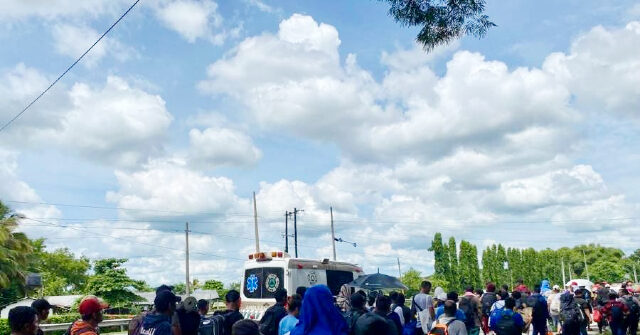A new migrant caravan consisting of roughly 1,000 individuals has set off from Mexico’s southern border this weekend, aiming to journey to Mexico City before potentially dispersing to reach the U.S. border. This marks the second major caravan formation since the inauguration of Mexico’s new president, Claudia Sheinbaum, on October 1. The caravan, which originated early Sunday morning in Tapachula, Chiapas, bears the name “God is Guiding Us” and includes migrants from a diverse array of countries such as Venezuela, Colombia, Ecuador, Peru, Haiti, Panama, and Costa Rica, as well as some from Afghanistan and Nepal. While en route to Mexico City, these migrants harbor aspirations of ultimately reaching the U.S., indicating the persistent trend of migration toward North America amidst a myriad of socio-economic factors.
The members of the caravan have been granted legal status in Mexico and were previously awaiting appointments for the Biden-Harris administration’s CBP One application in Chiapas. Despite possessing this legal status, many have expressed frustration over the prolonged waiting periods, which has prompted a decision to join the caravan as a means of advancing their journey. Jonathan Rojas, one of the caravan organizers, articulated a sense of urgency fueled in part by the political climate in the U.S., particularly concerns over former President Donald Trump potentially resuming his role and implementing stricter immigration policies. The sentiment among migrants points toward an anxiety over lost opportunities and the uncertainty surrounding immigration pathways.
The conditions in Chiapas have reportedly contributed to the migrants’ decision to depart, with Rojas highlighting the dire circumstances marked by overcrowding, insufficient resources, and lack of adequate medical care. Many within the caravan have echoed these concerns, emphasizing that the environmental conditions in their temporary accommodations are far from livable. Reports from sources such as Venezuela’s La Verdad have illustrated that food shortages and limited access to adequate healthcare in Chiapas are further pushing these individuals to seek better living conditions and opportunities in the U.S. This pattern reflects a broader narrative of migration that is increasingly driven by economic hardships rather than solely by political instability.
As the caravan progresses toward Mexico City, the individual experiences and motivations of the people involved in the caravan are diverse. Many participants are fleeing not only economic desperation but also the broader implications of political climates in their home countries. The caravan serves as a poignant symbol of resilience and communal effort among those driven to improve their living situations. It stands as a testament to the challenges faced by migrants who are often met with uncertainty, both during transit and at potential destinations. As they collectively embark on this journey, the caravan represents a critical intersection of human struggles encompassing survival, hope, and the quest for a more secure future.
Amidst their journey and aspirations, the caravan also raises pressing questions regarding immigration policies, humanitarian responses, and the effectiveness of migration management in light of increasing inflows of individuals seeking refuge and opportunity. The caravan’s departure highlights the complex dynamics of migration in Central America, particularly as it pertains to intergovernmental relationships between Mexico and the United States. As members of the caravan venture northward, the implications of their movement will likely resonate in broader political discussions regarding immigration reform, border security, and humanitarian obligations, urging a reevaluation of the support structures available for individuals in precarious situations.
In conclusion, the formation of this migrant caravan illustrates the intricate circumstances surrounding migration today, anchored by stories of personal struggle and collective hope as individuals seek to traverse borders in search of a better life. While legally in Mexico, the migrants’ frustration with waiting times, coupled with pressing conditions, has catalyzed their communal effort to push onward. As they face numerous challenges, both tangible and political, the caravan represents a significant moment in the ongoing narrative of migration and human rights. The resilience and determination displayed by these individuals illuminate the urgent need for comprehensive approaches to address the root causes of migration, emphasizing the importance of international cooperation and humanitarian consideration in a rapidly evolving global landscape.

